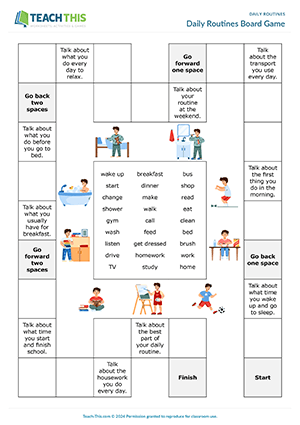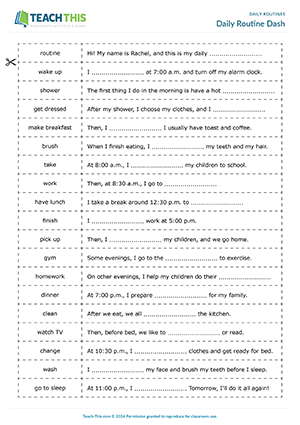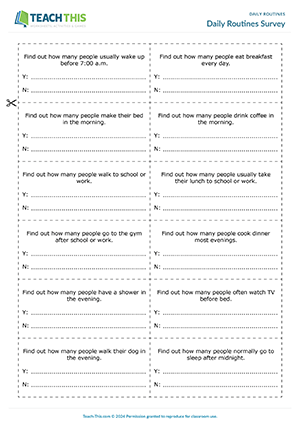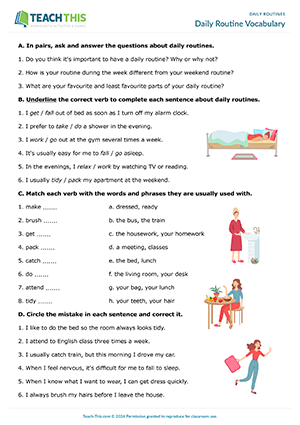In this free daily routines board game, students practice vocabulary related to daily routines and talk in response to topic-related prompts. Players take turns rolling the dice and moving their counters along the board. When a player lands on a square, another student picks up a card and reads out the sentence using the word 'blank' for the daily routine word in bold, e.g. 'I BLANK at 6:00 a.m. and turn off my alarm clock.' The player listens to the sentence, chooses a daily routine word from the game board, and says it aloud to complete the sentence, e.g. wake up. If the player says the correct word shown on the card in bold, they stay on the square. If not, they move their counter back two squares. If a player lands on a 'Talk about' square, they talk for 20 seconds in response to a prompt to remain on the square. If a player can't think of anything to say or stops talking before the 20 seconds are up, they go back two squares. The first player to reach the finish wins the game.
In these fun daily routines games, students complete sentences with vocabulary related to daily activities and then race to put the sentences in order to create a text about someone's daily routine. First, students play a pelmanism game where they match and complete sentences about a person's daily routine with related vocabulary. In pairs, students take turns turning over one vocabulary card and one gap-fill sentence card. If the daily routine word or phrase logically completes the gap-fill sentence, the student reads the sentence aloud, keeps the two cards, and has another turn. If not, the student turns the two cards back over. The student with the most pairs of cards at the end of the game wins. Afterwards, ask the students to look at their matched cards and elicit the answers from the class. As you go through each answer, students write the daily routine word or phrase into the gap-fill sentence. Next, pairs race to put the sentence cards in order to form a text about someone's daily routine. The first pair to do this wins. Finally, go through the order of the text with the class and review the daily routines vocabulary.
In this insightful daily routines activity, students conduct a survey where they ask and answer Do you...? questions about daily routines. First, each student creates the daily routine Do you...? question they need to ask from the prompt on their card, e.g. 'Do you usually wake up before 7:00 a.m.?' Students then go around their group, asking and answering the daily routine questions. Students note the number of people who answer yes or no to their question on the card. Finally, each student reports their findings to the class, e.g. 'Four people usually wake up before 7:00 a.m.'
Here is a useful daily routines worksheet to help students practice vocabulary related to daily routines. Students begin by discussing three questions about daily routines in pairs. Students then underline the correct verb in each sentence about daily routines. Next, students match each verb with words or phrases they are usually used with. After that, students find mistakes in routine-related sentences and correct them. Following that, students use words from a box to complete a text about a person's daily routine. Students then write a paragraph about their own daily routines using the vocabulary from the worksheet. Finally, students take turns presenting their daily routines to the other students, who listen and decide whose daily routine is the most similar to their own.
In this engaging daily routines speaking activity, students ask and answer questions about their daily routines and habits. First, students complete 'Find someone who...' prompts with daily routine verbs in their correct form. Next, students go through the prompts and prepare the yes/no questions they need to ask in the activity, e.g. 'Do you usually get out of bed before 6:30 a.m.?' Students then go around the class asking each other the daily routine questions. When a classmate answers 'yes' to a question, the student writes down their name and asks a follow-up question to gain more information, noting down the answer in the last column. Afterwards, students give feedback to the class on what they found out.
Latest Free
Resources
- Everyday Objects Bingo
Everyday Objects
Elementary (A1-A2)
- Action Verb Races
Actions
Elementary (A1-A2)
- Birthday Basics
Birthdays
Elementary (A1-A2)
- Sales Phrasal Verbs
Business Phrasal Verbs
Upper-intermediate (B2)
Latest Member
Resources
- Collocations at Work
Business Collocations
Intermediate (B1)
- Etiquette Trivia Board Game
Etiquette and Manners
Upper-intermediate (B2)
- Everyday Objects Vocabulary
Everyday Objects
Pre-intermediate (A2)
- Let's have a talk
Verb-Noun Collocations
Pre-intermediate (A2)








